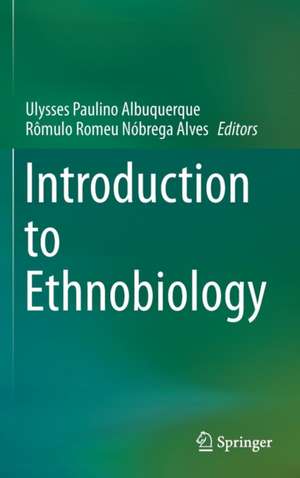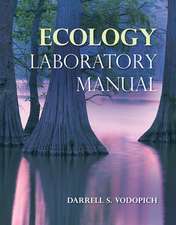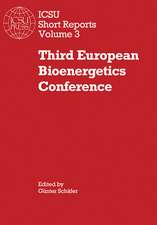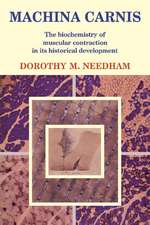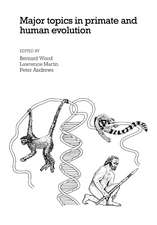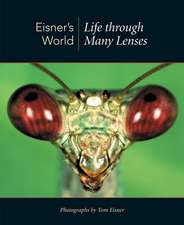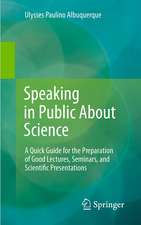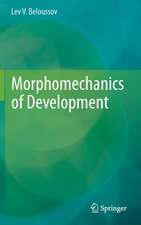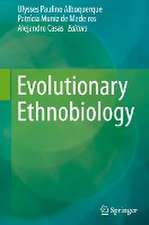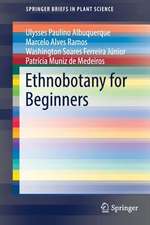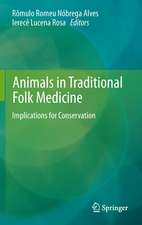Introduction to Ethnobiology
Editat de Ulysses Paulino Albuquerque, Rômulo Romeu Nóbrega Alvesen Limba Engleză Hardback – 7 apr 2016
| Toate formatele și edițiile | Preț | Express |
|---|---|---|
| Paperback (1) | 698.15 lei 6-8 săpt. | |
| Springer International Publishing – 25 apr 2018 | 698.15 lei 6-8 săpt. | |
| Hardback (1) | 951.91 lei 6-8 săpt. | |
| Springer International Publishing – 7 apr 2016 | 951.91 lei 6-8 săpt. |
Preț: 951.91 lei
Preț vechi: 1160.86 lei
-18% Nou
Puncte Express: 1428
Preț estimativ în valută:
182.21€ • 197.98$ • 153.15£
182.21€ • 197.98$ • 153.15£
Carte tipărită la comandă
Livrare economică 21 aprilie-05 mai
Preluare comenzi: 021 569.72.76
Specificații
ISBN-13: 9783319281537
ISBN-10: 3319281534
Pagini: 300
Ilustrații: XII, 310 p. 15 illus., 10 illus. in color.
Dimensiuni: 155 x 235 x 24 mm
Greutate: 0.63 kg
Ediția:1st ed. 2016
Editura: Springer International Publishing
Colecția Springer
Locul publicării:Cham, Switzerland
ISBN-10: 3319281534
Pagini: 300
Ilustrații: XII, 310 p. 15 illus., 10 illus. in color.
Dimensiuni: 155 x 235 x 24 mm
Greutate: 0.63 kg
Ediția:1st ed. 2016
Editura: Springer International Publishing
Colecția Springer
Locul publicării:Cham, Switzerland
Public țintă
Upper undergraduateCuprins
What Is Ethnobiology.- History Ethnobiology.- Ethnobiology Or Ethnoecology.- Historical Ethnobiology.-Paleoethnobiology.- Urban Ethnobiology.- Diaspora Ethnobiology.- Ethnophycology.- Gastronomic Ethnobiology.- Ethnoprimatology.- Ethnobiology Of Change.- Political Ecology.- Ethnobiology, Ethics And Traditional Knowledge Protection.- What Is Environmental Perception.- Biota Perception And Use.- Biological Bases For Human Perception.- Risk Perception.- How And Why Should People Classify Natural Resources.- Alternative Views Of Folk Classification.- Fungi.- Food Plants.- Medicinal Plants.- Tonic Plants.- Magic Plants.- Ornamental Plants.- Timber Resources.- Animal Resources.- Plant And Landscape Local Management.- Indigenous Use Of Tropical Biodiversity And Ecosystem Domestication.- Extractivism Of Plant Resources.- Plant Domestication.- Domestication Of Animals.- Ethnobiology And Biodiversity Conservation.- Local Or Traditional Knowledge Transmission And Natural Resource Use.- Gender AndAge.- Ethnicity, Income And Education.- Urbanization, Modernization And Nature Knowledge.- How Does Social Status Relate To Traditional Ecological Knowledge?.- Plant Knowledge And Use In The Context Of Migration.- Cultural Comparisons In Ethnobiological Research.
Recenzii
“This valuable introduction to ethnobiology consists of 40 brief articles on various topics, all authored by leading experts from around the world. … The work also contains a thorough dictionary of major field terms. Overall, this title is essential reading for newcomers to ethnobiology and is valuable for individuals interested in the worldwide comparisons of human-plant and human-animal interactions. Summing Up: Recommended. Lower-division undergraduates through professionals and practitioners.” (E. N. Anderson, Choice, Vol. 54 (2), October, 2016)
Notă biografică
Ulysses Paulino de Albuquerque, Federal Rural University of Pernambuco, Recife, Brazil
Romulo Romeu da Nobrega Alves, State University of Paraiba (UEPB), Brazil
Textul de pe ultima copertă
This book covers teaching ethnobiology at the undergraduate and graduate levels. Providing an explanation of the historical and conceptual aspects of ethnobiology, the work addresses relatively new or little debated approaches which will interest even the most experienced researcher in the field of ethnobiology.
The appropriation of nature, in various forms, may be perceived by mankind in certain ways. This work specifically addresses this initial stage of the relationship between humans and nature, along with the classic debate and the major theoretical contributions regarding how humanity classifies nature. This discussion is expanded upon, addressing the consequences of a utilitarian relationship with nature, the extractivism of forest products, and plant and animal domestication. The work then provides a synthesis of which variables affect local biological knowledge (LBK). The text includes a reference list in each chapter as well as a small glossary of ethnobiology termsand related areas, allowing readers to gain a deeper understanding of the covered topics.
The appropriation of nature, in various forms, may be perceived by mankind in certain ways. This work specifically addresses this initial stage of the relationship between humans and nature, along with the classic debate and the major theoretical contributions regarding how humanity classifies nature. This discussion is expanded upon, addressing the consequences of a utilitarian relationship with nature, the extractivism of forest products, and plant and animal domestication. The work then provides a synthesis of which variables affect local biological knowledge (LBK). The text includes a reference list in each chapter as well as a small glossary of ethnobiology termsand related areas, allowing readers to gain a deeper understanding of the covered topics.
Caracteristici
Introductory ethnobiology textbook for beginners Includes a formal presentation of theories and approaches on the interrelationship between people and natural resources Explains evolution and ecology as driving forces to understand human behavior regarding natural resources Includes a reference list in each chapter as well as a small dictionary of ethnobiology terms and related areas Includes supplementary material: sn.pub/extras
